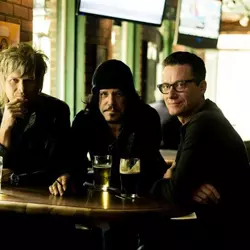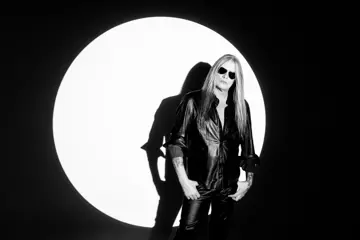 The Tea Party
The Tea PartyBetween the year they got together, 1990, in their then hometown Toronto, Canada, and the day they decided to give it away in 2005, The Tea Party did multiple runs around their own country and dozens of overseas tours. Their seven studio albums sold around two million records worldwide and they generally did everything any self-respecting band does in order to be as creative and simultaneously self-destructive as possible. Thankfully, they all made it through and last year, back home in Canada, an opportunity came up to reconvene and play a few shows. They did – and it felt good.
“It was a desire to go forward at some point,” begins drummer and percussionist Jeff Burrows, “and we had to take a few steps back and engage each other. We weren't talking at all for seven years, so if we wanted things to evolve and improve, we've got to be in each other's faces, you know? Influence each other, learn to respect each other again. So, it's not been easy, but it's been fun.”
Burrows initially joined a one-off project with two members of fellow Canadian trio, Rush, and others, called Big Dirty Band, then another Windsor-based musician, David Cyrenne in jam band, Is There A Band In The House?, plus has gigged and recorded with bands Johnny Hollow and The Kordz. Meanwhile in those intervening years, bass and keyboards player Stuart Chatwood has been busy composing video game soundtracks, including the eight Prince Of Persia games. Frontman, singer and guitarist Jeff Martin has kept the highest profile, particularly in Australia – where he lives in Perth for some of the year – with The Armada and 777 as well as solo and in a duo with d.i.g./Tim Whitlams drummer Terepai Richmond. He's also produced records for, among others, Perth band The Eternal.
“For me personally,” Martin explains, “it's like that with the solo tangents that I went with on, the two different bands and all that stuff since The Tea Party. What it's done for me is it's kept my chops up, especially like writing, being in the studio, producing, all of that, you know. And it's constantly a learning curve and everything, so if there was ever going to be a hope of The Tea Party getting back together – and here we are – at least I wouldn't go into it from seven years in the wilderness,” he laughs.
Don't miss a beat with our FREE daily newsletter
“What's binding the three of us right now is the music and reacquainting ourselves with our audience; acquainting ourselves with a new audience. There are hurdles, logistics to go through, but at the end of the day we all live in hope that there would have to be new music as far as The Tea Party's concerned, after this year, in order to continue.”
“See, when I woke up from my dream this morning, this came to me – thank you for letting me take the floor for a few minutes,” Chatwood chips in, as the others splutter and laugh. “Basically we're alchemists, we create something precious and if you want to continue the analogy, we're creating precious metal here. But it involves three things – we have to have our mindset and our intentions, then we have the elements that are built into the thing and then there's the process. So if you looked at some of our projects from ten miles up, you'd see this triangle of our intentions, elementals and process – and we got it really right on [1995's] The Edges Of Twilight and on [1999's] Transmission, where we had integrity, we had amazing elementals, the influences.
“On The Edges Of Twilight there were the halcyon days of British rock and blues, world music and a little bit of [Australian-Irish band] Dead Can Dance, on Transmission it was what we'd done prior but also Einstürzende Neubauten, Front 242, Nine Inch Nails remix records – even Kraftwerk in some cases – and that was based upon this honest integrity and the process just brought out these experiments and this freedom to create. After that I just feel things eroded a little bit, especially in the process where I think the final record [2004's Seven Circles] was a bit of a mess of drugs and alcohol. The influence side, the elementals were just really being influenced by ourselves instead of bringing brand new ideas into the fold, then our intention wasn't set from the outset.
“So all three points of the triangle were weak, and we have to work on at least getting back to that initial thing where each side is solid with creative influences and ideas, which I think we will because, like they've said, we've been apart seven years, and set our intentions and integrity. You have to stay artistically pure and make records for yourself and never pander or not let the critics reviews inform what you do creatively.”
Martin agrees: “What we did in those last few records was let people and the music industry get to us, which was never our intention in the first place and that would be one of the strongest musical statements that we made – we were a closed book. You were not allowed in – it was just the three of us against the world. That was it and we had some great people working with us along the way and it's actually Steve Hoffman, our manager. He was basically the one, that with these three very different personalities, he kept it all together, he made the balancing act work. Then when he passed away, there was no one really to lead the ship anymore and that was the problem. There was no focus and things just started to drift away.”
“I think what happened when we did separate,” Burrows takes up the thread, “it enabled us to step back individually and look at ourselves in the mirror and figure out who we are as individuals, as we already had that with records one, two and three, which is what Stuart and Jeff are talking about, because after that we'd sort of become The Tea Party Machine. It's good to be involved in that machine, but each identity isn't separate from itself and it just turns into this machine; this unemotional, unattached machine. If we can harness the original intent and bring it all back together in the end, we'll end up with a great piece of work collectively.”
“And at this stage in our career,” Martin adds, “we've probably got one chance to make the greatest record of our career. Sounds like a documentary!” And all three have a good laugh. It looks pretty much like they're all back on the same page, which means right now, at least in concert, they'll be delivering the best of their best.















